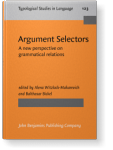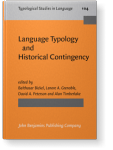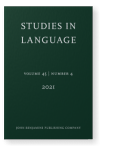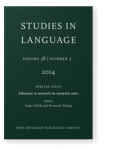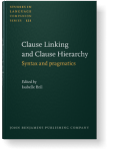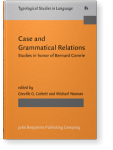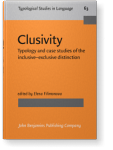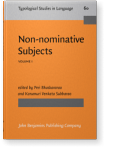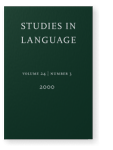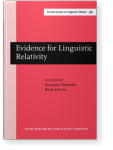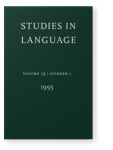Balthasar Bickel
List of John Benjamins publications for which Balthasar Bickel plays a role.
Book series
Titles
Argument Selectors: A new perspective on grammatical relations
Edited by Alena Witzlack-Makarevich and Balthasar Bickel
[Typological Studies in Language, 123] 2019. vi, 536 pp.
Subjects Semantics | Syntax | Theoretical linguistics | Typology
Language Typology and Historical Contingency: In honor of Johanna Nichols
Edited by Balthasar Bickel, Lenore A. Grenoble, David A. Peterson and Alan Timberlake
[Typological Studies in Language, 104] 2013. viii, 512 pp.
Subjects Historical linguistics | Theoretical linguistics | Typology
2023 Word order evolves at similar rates in main and subordinate clauses: Corpus-based evidence from Indo-European Diachronica 40:4, pp. 532–556 | Article
In syntactic change, it remains an open issue whether word orders are more conservative or innovative in subordinate clauses compared with main clauses. Using 47 dependency-annotated corpora and Bayesian phylogenetic inference, we explore the evolution of S/V, V/O, and S/O orders across main and… read more
2021 Morphological structure can escape reduction effects from mass admixture of second language speakers: Evidence from Sino-Tibetan Studies in Language 45:4, pp. 707–752 | Article
Morphological complexity is expected to decrease under mass admixture from adult second language speakers. While this has been chiefly shown for morphological richness, an unresolved question is whether the effect extends to aspects of morphological boundedness. Here we report a case study of… read more
2016 Semantic role clustering: An empirical assessment of semantic role types in non-default case assignment Advances in Research on Semantic Roles, Kittilä, Seppo and Fernando Zúñiga (eds.), pp. 51–78 | Article
This chapter seeks to determine to what extent there is cross-linguistic evidence for postulating clusters of predicate-specific semantic roles such as experiencer, cognizer, possessor, etc. For this, we survey non-default case assignments in a sample of 141 languages and annotate the associated… read more
2014 Semantic role clustering: An empirical assessment of semantic role types in non-default case assignment Advances in research on semantic roles, Kittilä, Seppo and Fernando Zúñiga (eds.), pp. 485–511 | Article
This paper seeks to determine to what extent there is cross-linguistic evidence for postulating clusters of predicate-specific semantic roles such as experiencer, cognizer, possessor, etc. For this, we survey non-default case assignments in a sample of 141 languages and annotate the associated… read more
2013 Distributional biases in language families Language Typology and Historical Contingency: In honor of Johanna Nichols, Bickel, Balthasar, Lenore A. Grenoble, David A. Peterson and Alan Timberlake (eds.), pp. 415–444 | Article
This paper introduces a method (the Family Bias Method) that estimates statistical biases in diachronic developments on the basis of synchronic samples. Estimates of developments are sought from their expected synchronic results: if a structure S outnumbers non-S significantly in a family, a change… read more
2013 The acquisition of ergative case in Chintang The Acquisition of Ergativity, Bavin, Edith L. and Sabine Stoll (eds.), pp. 183–208 | Article
The acquisition of ergative marking in Chintang (Sino-Tibetan, Nepal) seems challenging: the marker covers several functions but is rare in discourse because of NP ellipsis and syntactic constraints. Based on a longitudinal corpus of four children, we find that children master the ergative only… read more
2013 Capturing diversity in language acquisition research Language Typology and Historical Contingency: In honor of Johanna Nichols, Bickel, Balthasar, Lenore A. Grenoble, David A. Peterson and Alan Timberlake (eds.), pp. 195–216 | Article
In order to understand how children cope with the enormous variation in structures worldwide, developmental paths need to be studied in a sufficiently varied sample of languages. Because each study requires very large and expensive longitudinal corpora (about one million words, five to seven years… read more
2010 Capturing particulars and universals in clause linkage: A multivariate analysis Clause Linking and Clause Hierarchy: Syntax and pragmatics, Bril, Isabelle (ed.), pp. 51–102 | Article
Cross-linguistic variation in adjoined clause linkage is higher than what is allowed by universal concepts like ‘coordination’ or ‘subordination’ which entail sets of strictly correlated properties. This chapters uses statistical techniques to uncover probabilistic correlations and clusters in a… read more
2008 On the scope of the referential hierarchy in the typology of grammatical relations Case and Grammatical Relations: Studies in honor of Bernard Comrie, Corbett, Greville G. and Michael Noonan (eds.), pp. 191–210 | Article
Split alignment in case-marking has often been hypothesized to be affected by the referential hierarchy in that higher-ranking arguments are more likely to be accusatively aligned while lower-ranking arguments are more likely to be ergatively aligned. A survey of typological databases suggests that… read more
2005 Inclusive-exclusive as person vs. number categories worldwide Clusivity: Typology and case studies of the inclusive–exclusive distinction, Filimonova, Elena (ed.), pp. 49–72 | Chapter
2004 4. The syntax of experiencers in the Himalayas Non-nominative Subjects: Volume 1, Bhaskararao, Peri and Karumuri V. Subbarao (eds.), pp. 77–112 | Chapter
2000 On the syntax of agreement in Tibeto-Burman Studies in Language 24:3, pp. 583–610 | Article
Verb agreement in Tibeto-Burman languages follows a different principle than in other, especially Indo-European languages. Instead of limiting agreement to the unification of features of the agreement trigger with those of the target, Tibeto-Burman languages also allow NP features to combine with… read more
2000 Grammar and social practice: On the role of ‘culture’ in linguistic relativity Evidence for Linguistic Relativity, Niemeier, Susanne and René Dirven † (eds.), pp. 161–192 | Article
1995 In the Vestibule of Meaning: Transitivity Inversion as a Morphological Phenomenon Studies in Language 19:1, pp. 73–127 | Article
In the Belhare (Tibeto-Burman) verb, morphotactics and allomorphy, but not morpheme semantics, are sensitive to a distinction between direct (1>2, 1>3, 2>3, 3SG>3) and inverse (3NS>3, 3>2, 3>1, 2>1) participant configurations. Comparison of this phenomenon with Cree (Algonquian) and rGya-ro… read more
Paradigmatic complexity metrics as signals of phylogenetic relatedness: A proof of concept in Romance and Pamean diachrony Diachronica: Online-First Articles | Article
Morphological complexity metrics like entropy, and notions like the Paradigm Cell-Filling Problem, have recently (re)gained popularity for the synchronic analysis of inflectional systems. The potential of these quantitative approaches for diachronic research, however, remains largely untapped.… read more

